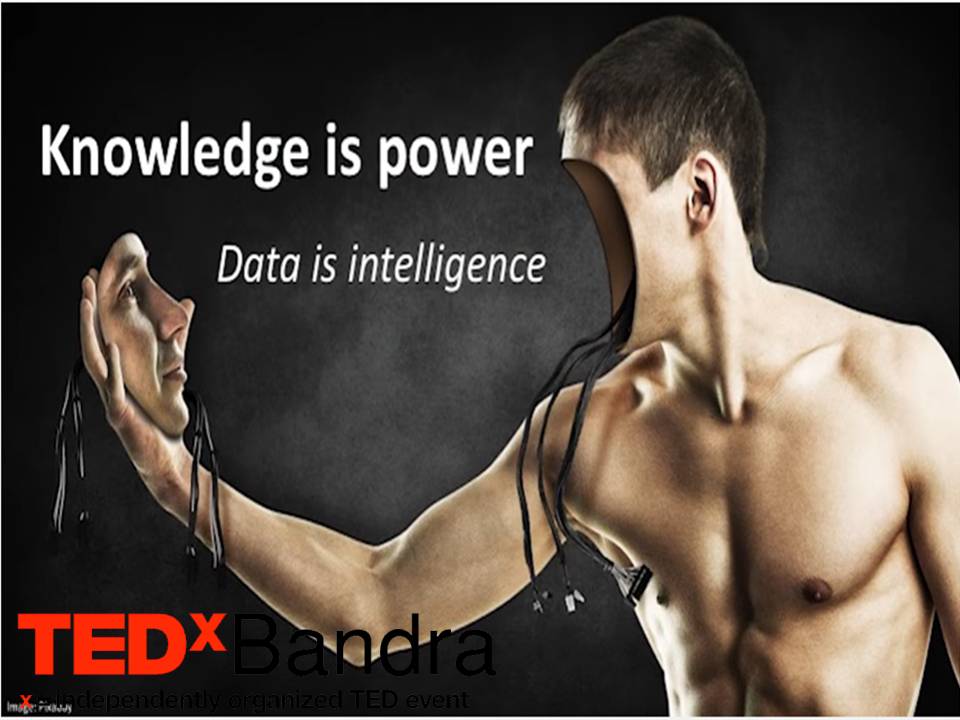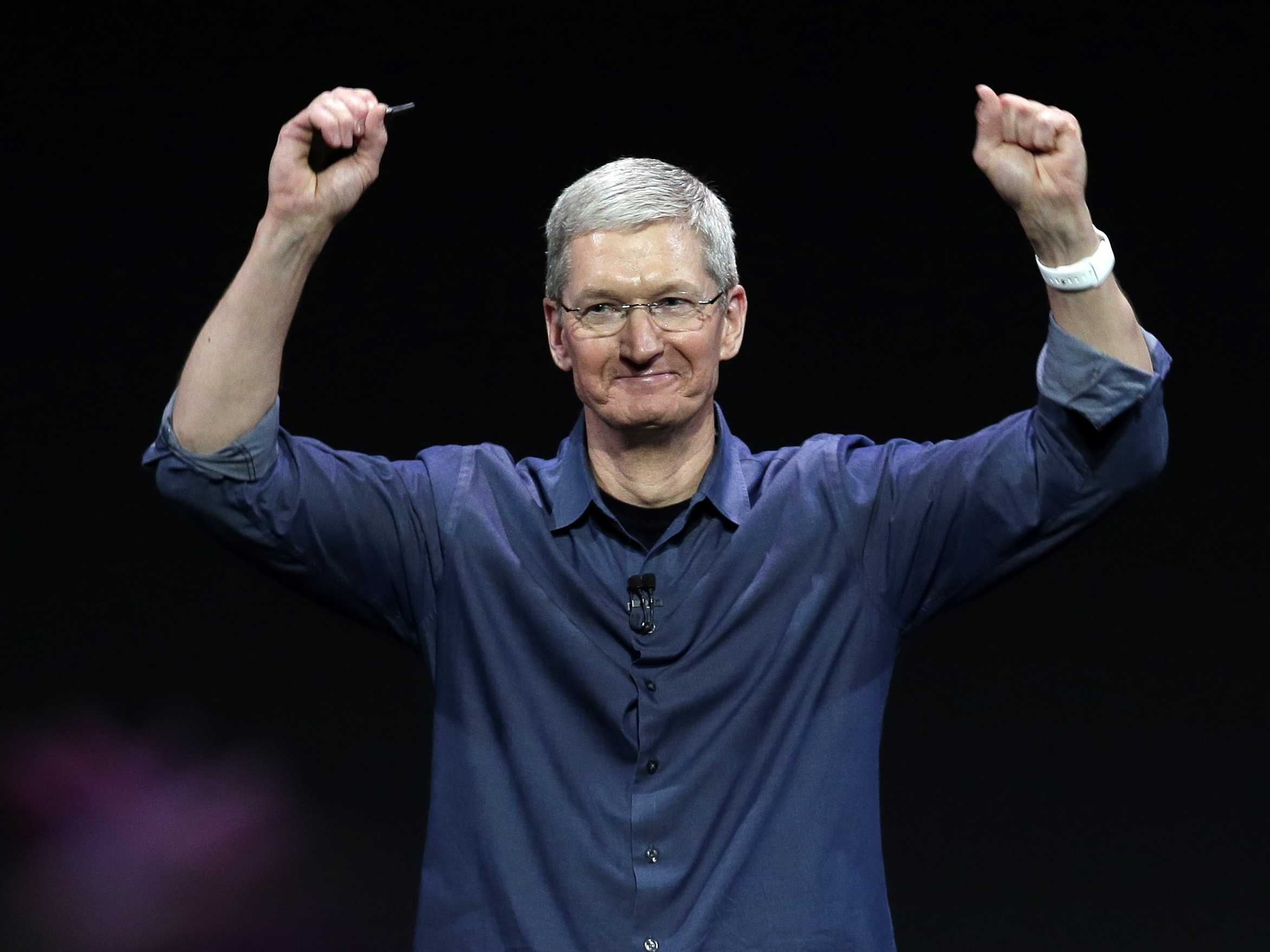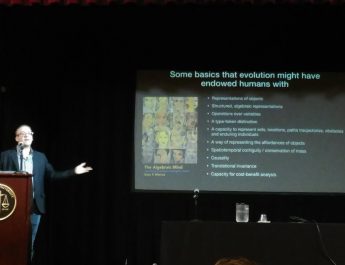Kaiesh Vohra, who earned a first class honours degree in Artificial Intelligence and Computer Science from University of Edinburg, is going to talk to you about artificial intelligence, its societal impact, why it’s important, why you should know about it, and why you should be trying to get involved with it..
“I like this image particularly.. Because it evokes one of a very uncomfortable sensation. Because it’s something which we’re not familiar with yet. It represents what we believe and what we look like.”

“Education is paramount. We’ve made fantastic growth in just the past ten years in the number of people that have had access to education and have actually grown themselves right in terms of being able to go from one percent of people with college degrees just ten years ago so now over seven percent is monumental. This is incredible only for one reason: Education is difficult to attain and it is expensive. You’ve just heard the story about the farmers and access to education from there is incredibly hard. So the fact that we’ve done this is nothing short of exceptional.”
The data that’s available is quite sparse but when we take US data. It shows us that over the past 50 years the earning power of a full-time new graduate has remained stable. This means that the basket of goods somebody is able to buy is actually equivalent to what it was years ago which is good. That means that the quality of life in theory has been maintained. What we are seeing as well is that the shift in the areas people are working. It’s largely going towards more service orientated businesses so this means more knowledge work.
So this is also good because what it’s saying is we’re learning more we’re applying more into this sector right which means that we are growing the potential for our knowledge to be applied into society. We’re seeing decreasing volumes of people in agriculture and an industry and this is fine. Because, it means that what’s happening is we’re becoming more efficient with what we’re doing.
But by adding roughly 200 million people to the workforce over the past 20 years or 30 odd years we’ve seen that there’s about 64 million which remain unemployed. This is the addition to the unemployment volume. So let’s just recap we’ve got more people educated which is good we’ve got people earning at parity to what they used to if they’ve got full-time jobs which is great. There’s a higher number of jobs that are inside the services sector which means more knowledge being applied, more knowledge actually coming out and creating more advances talking about drones talking about new types of technologies all now because of this this development and growth.

But we have more people unemployed actually at a percentage level as well. It’s getting harder to get jobs. It’s getting harder to keep them. These numbers are for youth unemployment. So this is for people trying to get their first-time job.
This percentage you would have hoped would have gone down. Because you’ve educated more that dotted line the yellow line in the middle shows you where we were at 1%. So you would have imagined that actually we would have more jobs available. Because there’s more demand. Yet, there’s less and it’s getting difficult for people it has been difficult for people to get their jobs and retain and it’s got to get harder.
The reason for this is because artificial intelligence is pervading society. We’ve seen it and you’ve experienced it for a long time. Some of you may not have known that it’s there and it’s around you. But it is.. The popular ones that you can see are the ones I’ve tried to highlight on the left. So I think pretty much everybody’s heard of Tesla and you’ve seen the advancements they’re making everyone’s head of the Google driverless car. There’s a number of driverless initiatives which are taking place you’ve got driverless truck driving companies. These all exist.. All of these technologies exist today.

None of this is future thinking. This is here.. So cars are driving themselves. Trucks are driving themselves. Just that segment in the US alone makes up for 4 percent of employment. Direct.. You’ve got farming equipment which is being developed in Europe which is entirely self-governing.
The farm are now just using an iPad and it tells him what to do. So these developments are impacting stuff that we already use day in day out. Chefs I saw an amazing development the other day where Jamie Oliver can now prepare one dish, it can be recorded, you can install robot arms in your kitchen and you can now have Jamie Oliver dishes whenever you want.

This is outstanding you no longer need a chef. You just need one.. Baristas (A barista is a person who prepares and (also, generally) serves espresso-based coffee drinks.). This is now entirely automated. You do your mix on your smartphone and say this is the coffee I like and where ever you walk now across the United States you can walk into an automated barista no humans required please do not apply.
The little thing at the bottom with the boxes humans not required. Amazon’s already doing this it’s all of their factories and I have a level of automation where all the equipment is moved around through mini robots that can move more, move faster, never get tired, don’t require days off, no leave required.. They just keep doing their work. And now they’ve got drones which will deliver for you as well. So you can order, they will predict using AI what the demands going to be and they’ll ship to you with no humans involved.
Secretaries.. I have and I haven’t had ever before.. But I have a secretary now she’s a bot. She’s wonderful. I don’t need to give her days off. She cost me$20 a month. It’s impossible for humans to compete with this type of progress. It’s fantastic from the purposes of looking at it commercially. It’s wonderful. But what it’s doing is it’s creating a higher barrier for first-time job entrance.
If you go with what we have done in the past and that’s important. If you try to look at what we’ve done in the past, you cannot imagine that I can’t get a job now because a machine’s going to do it. What has changed is artificial intelligence new is this something that we didn’t see coming. AI is actually being researched for the past 60 old years. In 1956, there was the first conference which used the term artificial intelligence. So this is not new. This has been around for a long time.
The progress is sharp. Because of the changes in technology I haven’t even spoken about and I won’t in this talk about quantum computing and the impact of that. But with our regular progress in regular computers that you now hold in your pockets.
This speed of development has allowed us to create a massive change in the computational power available. This change allows us to apply more complex algorithms faster. The difference between artificial intelligence and regular code is that regular code tells the computer what to do step by step even if something gets in its way it will continue to try and execute the next step. It doesn’t know that there’s something wrong.
Artificial intelligence is different. It is goal orientated. You tell it “that’s what I want to achieve” “I want to get to the top of the stairs” it will then self navigate its way to the top of the stairs. It will observe that it’s fallen over there are obstructions there’s a cat in the way. It will find its way to the top and once it achieves its goal it’s done. So you keep giving it new goals, you keep giving it new things to do.. This is how we’ve evolved over time with AI.
Machine learning is another popular phrase. But, what does it mean? It means that every time it gets something wrong, it learns from that and it changes its decision-making capability. Children do this. So, machines do this very badly? Children do this very well. So, why does it get a little bit scarier. Because, once you actually get to move forward with processing power you get to process more data then this means that you learn faster.
Humans communicate and we exchange knowledge using our mouths. Machines do this automatically through data. For me to educate you on something it takes time. For another machine to know something. it’s instant.. As soon as it learns it, all the other machines know it. This is very valuable for u.s Because it allows us to move very quickly in terms of the progression. So the more processing speed we get, the more data we get, the faster all of our machines learn which means we can do more things with them which is why now we’re able to replace basic repetitive functions with intelligent machines.

The revenue from this sector looks like one of those startup revenue graphs which is fantastic. It goes from just goes from half a billion dollars by our revenues which was last year predicted to be in excess of over thirty six billion dollars largely through enterprise. What does that last bit mean? It means that corporate and commercial activities will be the large drivers of this. Because, it’s more economical.. Getting involved with this is important.
Commercially a lot of tasks employment will go to machines. I was talking to a banker in India just yesterday in fact about their artificial intelligence activities and what they’re doing is they are actively creating ways for the machine to automate your assessment of mortgages. Your assessment of your creditworthiness. They were going to actually create twenty jobs. But they decided not to.. Because they’re going to use BOTS to do it instead so now they only need two people to look at the screens. One person to feed the dog to guard the two people looking at the screens. More is different. I don’t know how many of you have read this paper. But it’s fantastic. It basically says that you can’t take what you see in one micro view and apply reductionism to get to the next piece and then apply that same logic there. What is the relevance of this?
We’ve seen technology before. We’ve seen mechanization come in. We’ve seen all of these changes and it’s very easy to say: “Well, we just look at what happened in the past and now we can apply that again and we can apply the same sort of logic to it.” It’s not going to be exactly the same.

Software is borderless. It is not impacted by regulation in transfer. It does not cost to move around 3d printing additive manufacturing. But you can now borderlessly transfer information about how to create things. You don’t need to send prototypes. You don’t need to get that knowledge from somewhere else. You just email it.
The difference between developed economies and emerging economies is profound. We have a huge volume of employment. That’s actually in agriculture which is one of the things because it’s very labor intensive and again we earlier saw that you can use drones to do some of this work once that gets entirely automated, the jobs on the field reduce.
Now again, this is not a bad thing. But.. because of the magnitude of change, you cannot apply the same logic for change that you would in a developed economy as you would here. The changes for emerging market will be far more profound in terms of our employment in terms of the education that needs to be applied and in terms of how we prepare ourselves for the change.
I encourage you to understand much more about this field. You should be the ones that know this is coming. Prepare yourselves for it! Look at your businesses! Look at what you do! Understand how this technology can be applied to you! Imagine it, Begin to apply it, You have to be at the front of this technology. We have some of the best minds in mathematics and statistics which is what AI is. We should be able to drive this. It will change us. And if you sit by, that change will come and steamroll straight over you just like the machines did in the past.
Let’s be prepared let’s get ourselves more prepped for this …

Who is Kaiesh Vohra?
Kaiesh is the CEO and Co-Founder of Lucep, a Singapore head-quartered startup that uses artificial intelligence to accelerate sales. In the past couple of years, Kaiesh has built Lucep into a company that interacts with thousands of customers around the world daily, supporting some of the worlds largest financial institutions, hospitality groups, and healthcare institutes.




